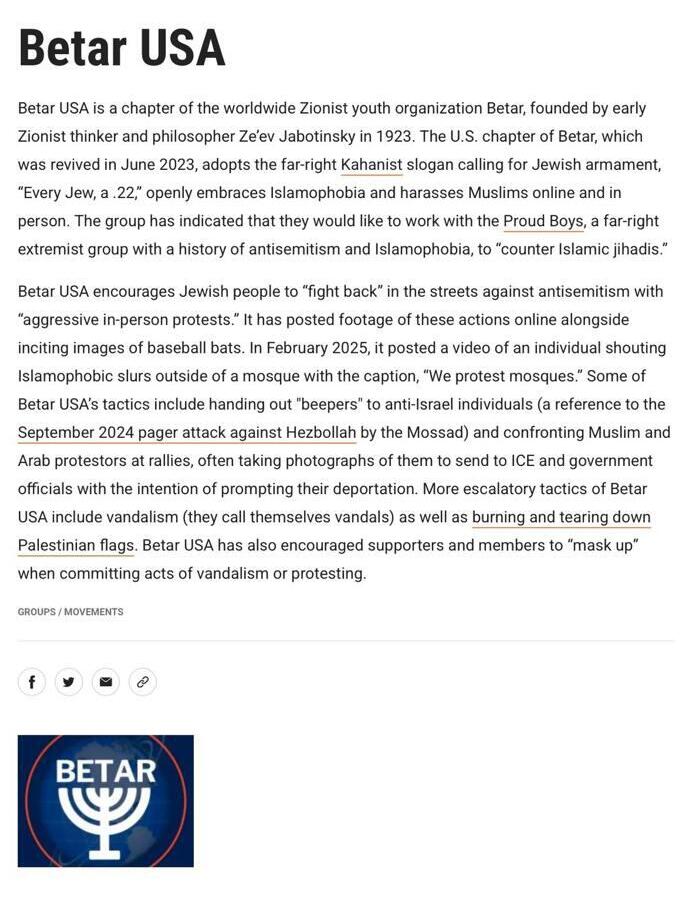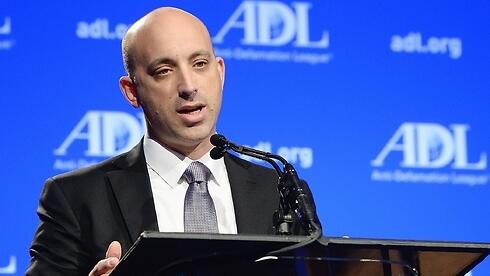Getting your Trinity Audio player ready...
The Jewish nationalist movement Betar is criticizing the Anti-Defamation League (ADL) following its inclusion in the organization’s extremist watchlist, a designation the group calls “baseless.” In response, Betar USA accused the ADL of misrepresenting its activities while failing to focus on threats against the Jewish people.
The controversy emerged after the ADL added Betar US to its glossary of extremist groups, alleging that the movement had adopted far-right rhetoric and engaged in confrontational protests.
The ADL’s report claims that Betar US - the only Jewish group on its list - has promoted the use of force and incited its members to vandalize Palestinian symbols. ADL argues that such actions align with broader patterns of extremism that the organization monitors.
Betar, founded in 1923 by Revisionist Zionist leader Ze’ev Jabotinsky, has long been associated with Jewish self-defense and nationalist ideals. The movement sees the ADL’s accusations as an "attempt to delegitimize its commitment to Jewish strength and security."
In a statement, Betar US rejected the notion that its advocacy for Jewish self-defense equates to extremism. “On the same day that Oded Lifshitz, Shira, Ariel and Kfir Bibas were returned home in coffins, the ADL chose to criticize Zionist Jews rather than confront the real enemies of our people,” the statement read. “We reject the accusation of ‘Islamophobia.’ A phobia is an irrational fear — there is nothing irrational about our concern over the spread of jihadism.”
“Our reporting speaks for itself. However, it is important to note that the Glossary of Extremism and Hate is not a list of ‘designated hate groups’ and ADL does not maintain a formal list of hate groups,” an ADL spokesperson told Ynet.
Get the Ynetnews app on your smartphone: Google Play: https://bit.ly/4eJ37pE | Apple App Store: https://bit.ly/3ZL7iNv
The dispute reflects a broader debate within the Jewish community over how to define and combat antisemitism. The ADL, which based itself as a global leader in fighting extremism, has expanded its focus beyond antisemitism in recent years to track hate groups and promote diversity initiatives. This shift has drawn criticism from some nationalist factions within the Jewish world, who argue that it blurs the lines between legitimate activism and extremism.
One of the central claims in the ADL’s report is that Betar US has aligned itself with extremist, non-Jewish groups. The listing suggests that Betar members have sought cooperation with the Proud Boys, a group with a documented history of antisemitism. Betar US denies the allegations, calling them a “politically motivated mischaracterization.”
But in a January 25 post on X, Betar US wrote: "Will the proud boys or hells angels or other related American nationalist groups care to join us to counter Islamic jihadis? We don’t yet work with them but would very much like to. We are loud proud Zionist Americans. We welcome inquiries from all who stand against jihad and their dangers to america."
The post was in response to reports that Betar US was compiling lists of foreign students in the U.S. who have supported Hamas or joined anti-Israel protests, in order to effect their deportation under President Donald Trump’s proposed policies.
“Does the ADL now consider the Israeli government extremist?” a Betar spokesperson asked, pointing out that high-profile Israeli politicians, including Consul General of Israel in New York Ofer Akunis and Israel's Ambassador to the United Nations, Danny Danon, are Betar alumni. “Will the ADL boycott the Israeli government next?”
Critics of the ADL’s decision argue that it conflates Jewish self-reliance with extremism. Supporters of Betar see the movement as a necessary force in an era of rising antisemitic attacks, including violent assaults on Jewish communities in the U.S. and Europe. Meanwhile, ADL maintains that its assessments are based on patterns of rhetoric and activity that align with extremism, rather than political considerations.
The backlash against the ADL’s classification of Betar is emblematic of a broader struggle within American Jewry. While some view Betar’s hardline stance as a necessary response to antisemitism, others see its rhetoric as dangerously aligned with far-right nationalism.
Meta, for instance, has threatened legal action against a senior Betar official, accusing him of harassment and privacy violations. The company alleges that he publicly shared the contact details of Meta Israel’s lobbyist, Jordana Cutler, thereby inciting others to harass her.
Meta argues that this constitutes a serious breach of privacy and anti-harassment laws. Betar, in response, accused Meta of double standards, arguing that the company selectively enforces its policies against Zionist and Jewish voices while permitting anti-Israel rhetoric on its platforms.
Additionally, Betar has faced scrutiny from New York University (NYU), which filed a police complaint last month over alleged threats and vandalism by Betar activists. According to the university, the phrase “Betar was here” was spray-painted on the walls of the Institute for the Study of the Ancient World.
NYU also cited social media posts calling for “violent disruption” of pro-Palestinian events on campus. While Betar denied involvement in the vandalism, it defended its online statements, asserting that it would not stand idly by as pro-Palestinian groups “glorify terrorists and incite violence.”
The debate raises critical questions about where the line between security and extremism lies — and who gets to draw it. As tensions continue to mount, Betar is calling on its members and supporters to push back against what it sees as a campaign of delegitimization. “It is time to embrace a better way — the Betar way,” the group’s statement concludes.




